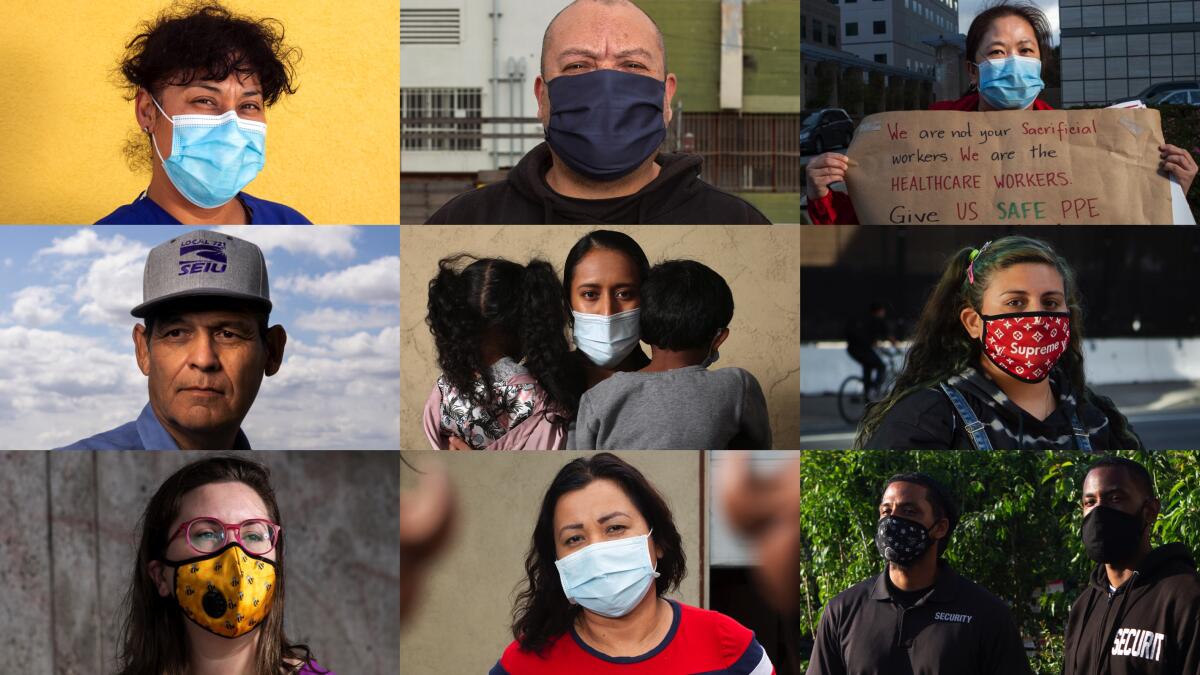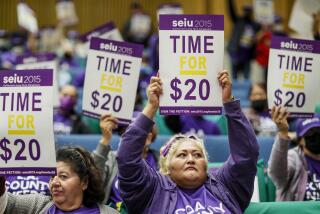California moves one step closer to five paid sick days, with unions banking on COVID lessons

- Share via
SACRAMENTO — California employers will be required to provide workers with five days of paid sick leave under legislation passed by the state Legislature on Wednesday, up from the current three-day requirement.
While similar attempts to expand paid sick leave have stalled in the past, politically powerful unions are banking on workplace lessons learned from the COVID-19 pandemic to be enough to get Gov. Gavin Newsom to sign the bill this time around.
But a long list of organizations representing employers opposed the bill, also pointing to the pandemic, warning that small businesses still reeling from the economic fallout of the virus will not be able to afford to provide more paid time off.
Essential workers bore the brunt of the pandemic, many of whom were low earners forced to choose between losing much-needed pay or braving exposure to the virus.
“Workers in California, including those who work in our grocery stores, packing facilities, pharmacies and beyond, deserve to be able to take the time off work they need without being forced to choose between going to work sick and risking their family’s livelihood,” Kathy Finn, president of UFCW Local 770, a supporter of the bill, said in a statement.
The state’s current three-day standard is “simply not enough to protect public health,” as some diseases can remain infectious for longer than that, said Dr. Curtis Chan, deputy health officer for San Mateo County.
“We should ask ourselves: Do we want someone with a bad cough — whether it’s from COVID, the flu, RSV, pertussis — to be working in your child-care center, the classroom of your children, factories or nursing homes?” Chan said at a news conference promoting the legislation last month. “Sick individuals must have time to rest, heal and isolate themselves from others.”
Even in the Democrat-controlled, union friendly Legislature, the bill, SB 616 by Sen. Lena Gonzalez (D-Long Beach), faced hurdles. It initially proposed requiring seven days of paid sick leave but was weakened in a crucial fiscal committee in the Legislature earlier this month.
The proposal — backed by the California Labor Federation and SEIU California — comes as workers across the state have gone on strike, demanding better pay and benefits
Influential business groups opposed the bill based on cost concerns, with the California Chamber of Commerce labeling it a “job killer,” saying employers could be forced to eliminate jobs and increase the price of goods and services for consumers in order to cope.
Opponents of the bill pointed to forced closures and new regulations imposed because of COVID-19. During the worst of the pandemic, Newsom signed legislation that required employers to provide up to two weeks of supplemental sick leave for employees diagnosed with COVID-19 who needed to quarantine. Those requirements have expired.
“Hopes that business may pick up after COVID-19 have not materialized for many, and these business owners had had to raise prices, cut jobs, or shut down,” the Chamber of Commerce said in a statement. “While one more paid benefit may not seem significant in isolation, this mandate must be viewed in the context of all of California’s other leaves and paid benefits, especially the special paid leaves required from 2020 through 2023 due to COVID.”
Chan, who had hoped for a seven-day requirement, said that the five-day proposal is better than what the state offers now but is still “often not enough for many individuals to recover from illness and for many workplaces to prevent infections.”
Critics of the bill said that the state should instead incentivize employers to offer more sick days by reducing costs in other areas instead of issuing a universal mandate.
Gonzalez said the pandemic acted as a good test case for extended sick leave, and the temporary policies are proof that they can succeed without decimating businesses.
“The economy wasn’t falling apart. The state still remained healthy,” Gonzalez said. “And fortunately, more importantly, the workforce felt supported.”
More than 2.7 million Californians lost their jobs during the pandemic-fueled recession and some businesses never recovered. But the state’s strict public health measures protected the economy overall, lowering virus rates and allowing faster reopening, according to UCLA economists. The state budget also thrived during COVID-19, as California’s tax structure relies heavily on high earners who did not suffer financially.
There is no federal law requiring paid sick leave. California issued its annual three-day minimum paid sick leave requirement in 2014. The benefit can be used to recover from physical and mental illnesses, attend medical appointments or care for ill family members.
Most states do not require paid sick time, including Florida and Montana. Among the 15 states that do, some provide more than California, including New York, which requires some businesses to provide seven days of paid leave, and New Mexico, which passed a law last year that allows employees up to eight paid sick days.
Some cities in California require more than the state standard, including Los Angeles, where employers must provide at least six paid days of sick leave.
California’s current paid sick leave mandate, signed into law nearly a decade ago, came after a long fight in the state Legislature, with unions split over who should benefit and concerns about costs to businesses and to the state.
Similar attempts to expand paid sick leave beyond the hard-fought three-day requirement have since failed.
The latest proposal is estimated to cost $34.6 million in its first year and $67.2 million annually after that as part of an expansion of the policy to include home health workers. Additional one-time costs — such as $1 million for payroll logistics — are also expected.
Newsom has warned that he will veto bills based on cost, as the state faces a $31-billion budget deficit. His Department of Finance opposes the bill, citing new state costs not included in California’s budget.
The Department of Finance has also voiced implementation concerns about the potential ramifications for the Division of Labor Standards Enforcement, which investigates wage theft and other workplace complaints. The agency already has “a backlog of cases,” resulting in some wait times lasting more than a year, the department said in a statement.
People like Jim Riffel, an instructional aide in Sacramento schools and a member of SEIU 1021, are optimistic that minds have changed about work and public health because of COVID-19.
Workers need to have the ability to stay home when they’re sick or their children are sick, so that children are not sent to schools while contagious, he said, causing a ripple effect in communities.
Without paid sick time, he watches families choose between health and pay, he said.
“When kids get sick, working poor families too often face terrible choices,” Riffel said. “These families are walking a tightrope with a very long way to fall.”
More to Read
Sign up for Essential California
The most important California stories and recommendations in your inbox every morning.
You may occasionally receive promotional content from the Los Angeles Times.











